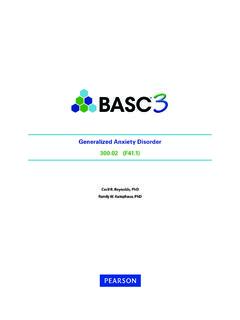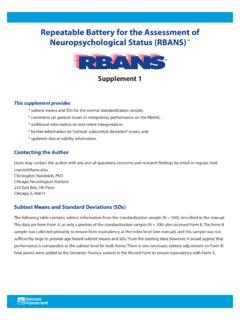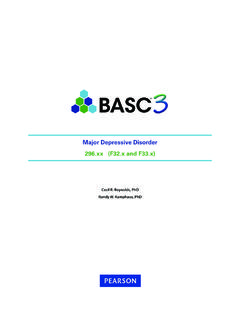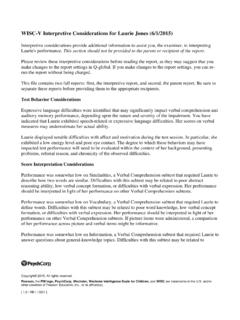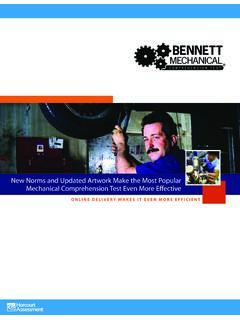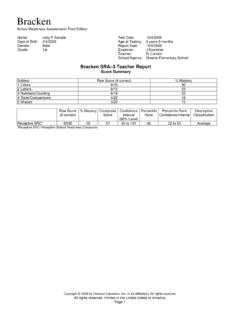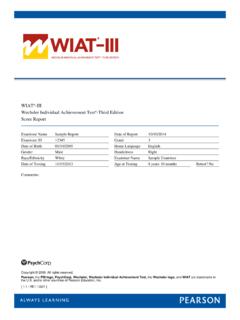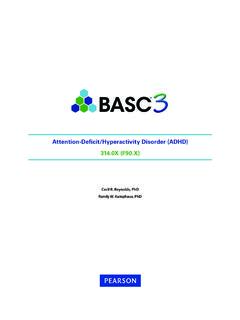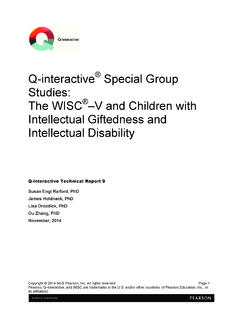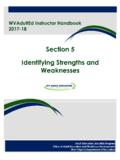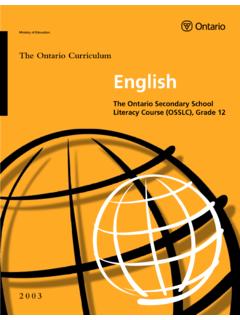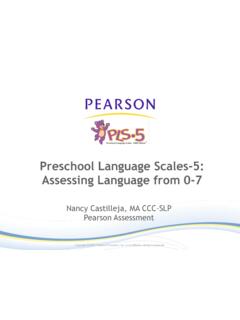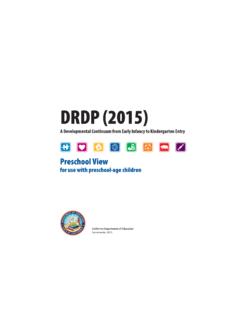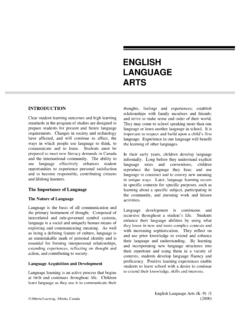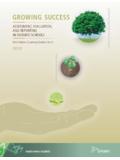Transcription of Assessing Cognitive Abilities in Young Children
1 Assessing Cognitive Abilities in Young ChildrenGloria Maccow, , Assessment Training ConsultantCopyright 2012. Pearson, Inc., or its affiliates. All rights Cognitive Abilities in Assessing Cognitive Abilities in Young ChildrenYoung ChildrenGloria Maccow, Training Consultant2 | Copyright 2011. All rights Describe Cognitive factors that account for differential classroom performance; Describe basic Cognitive processes and their relationship to higher-order conceptualization and reasoning. Describe assessment of Cognitive Abilities in Young Cognitive Abilities in Young ChildrenGloria Maccow, , Assessment Training ConsultantCopyright 2012.
2 Pearson, Inc., or its affiliates. All rights | Copyright 2011. All rights Early Childhood Programs, ..In Early Childhood Programs, .. some Children learn the pre-academic skills we present; some Children do not. 4 | Copyright 2011. All rights Early Childhood Programs, ..In Early Childhood Programs, .. some Children are able to wait their turn; others respond impulsively. Assessing Cognitive Abilities in Young ChildrenGloria Maccow, , Assessment Training ConsultantCopyright 2012. Pearson, Inc., or its affiliates. All rights factors may account for What factors may account for such differential performance?
3 Such differential performance?6 | Copyright 2011. All rights s Skillss Skills(Berninger, 2007)(Berninger, 2007)Individual Differences in the Processes in the Learner s Mind or BrainIndividual Differences in the Processes in the Learner s Mind or BrainCurriculum and Instructional MaterialsCurriculum and Instructional MaterialsTeachers Instruction (Pedagogy)Teachers Instruction (Pedagogy) Assessing Cognitive Abilities in Young ChildrenGloria Maccow, , Assessment Training ConsultantCopyright 2012. Pearson, Inc., or its affiliates. All rights | Copyright 2011.
4 All rights the ChildUnderstanding the Child s Minds MindPiaget s Stages of Cognitive DevelopmentSensori-motor (Birth to 2 years)Pre-operational (2 to 7 years)Concrete operational (7 to 11 years)Formal operational (11 to 15 years)Piaget s Stages of Cognitive DevelopmentSensori-motor (Birth to 2 years)Pre-operational (2 to 7 years)Concrete operational (7 to 11 years)Formal operational (11 to 15 years)(Santrock & Yussen, 1992)8 | Copyright 2011. All rights the ChildUnderstanding the Child s Minds MindInformation from the environmentInformation Information from the from the environmentenvironmentSensory and Perceptual ProcessesSensory and Sensory and Perceptual Perceptual ProcessesProcessesMemoryMemoryMemoryThin kingThinkingThinkingLanguageLanguageLang uage(Santrock & Yussen, 1992)Information ProcessingInformation ProcessingAssessing Cognitive Abilities in Young ChildrenGloria Maccow, , Assessment Training ConsultantCopyright 2012.
5 Pearson, Inc., or its affiliates. All rights | Copyright 2011. All rights ProcessingInformation ProcessingInputBrainMindCognitionOutput memory problem-solving reasoning(Santrock & Yussen, 1992)What Do We Assess?What Do We Assess?(Developmentally Appropriate)(Developmentally Appropriate)Examples of AssessmentExamples of Assessment(Examples of test items are not included in handout)(Examples of test items are not included in handout) Assessing Cognitive Abilities in Young ChildrenGloria Maccow, , Assessment Training ConsultantCopyright 2012. Pearson, Inc.
6 , or its affiliates. All rights | Copyright 2011. All rights Process of LearningThe Process of learning learning is the process of acquiring information. What are the Cognitive factors that enable students to show what they know and can do? learning is the process of acquiring information. What are the Cognitive factors that enable students to show what they know and can do?How do they collect, sort, store, and retrieve information? (Miller, 2007)How do they collect, sort, store, and retrieve information? (Miller, 2007)How do they receive, perceive, process, and remember information?
7 (Elliott, 2007)12 | Copyright 2011. All rights Is the child able to see the information? Is visual acuity within normal limits? What about visual discrimination? Is the child able to hear the information? Is hearing acuity within normal limits? What about auditory discrimination?InputInput Is the child able to see the information? Is visual acuity within normal limits? What about visual discrimination? Is the child able to hear the information? Is hearing acuity within normal limits? What about auditory discrimination?Output Is the child able to respond in writing?
8 Are fine motor Abilities within normal limits? Is the child able to respond orally? Are language production Abilities within normal limits?OutputOutput Is the child able to respond in writing? Are fine motor Abilities within normal limits? Is the child able to respond orally? Are language production Abilities within normal limits?SensorySensory--Motor Functions Motor Functions and Learningand LearningAssessing Cognitive Abilities in Young ChildrenGloria Maccow, , Assessment Training ConsultantCopyright 2012. Pearson, Inc., or its affiliates. All rights | Copyright 2011.
9 All rights and LearningAttention and learning selectively attend to certain stimuli while ignoring competing, irrelevant stimuli? sustain attentional focus for a prolonged period? selectively attend to certain stimuli while ignoring competing, irrelevant stimuli? sustain attentional focus for a prolonged period?Does the child .. shift attentional resources from one activity to another? respond to more than one task simultaneously divided attention? shift attentional resources from one activity to another? respond to more than one task simultaneously divided attention?
10 14 | Copyright 2011. All rights and LearningMemory and learning In schools, we expect Children to learnand rememberinformation. Often, the information is presented visually and/or verbally. Some of the information is novel; some is (Mather & Goldstein, 2008)LanguageLanguageImagesImagesStrateg iesStrategiesAssessing Cognitive Abilities in Young ChildrenGloria Maccow, , Assessment Training ConsultantCopyright 2012. Pearson, Inc., or its affiliates. All rights | Copyright 2011. All rights Processes Spatial Processes and Learningand learning Much of what is presented in school has either a visual -spatial or language basis.
